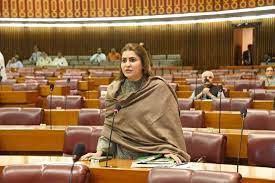BISP, a model of social protection for developing world, serves nine million households: Shazia Marri

Liaquat Ali
Berlin: Federal Minister and Chairperson Benazir Income Support Programme (BISP) Ms. Shazia Marri has said that a cash assistance initiative of BISP provided financial assistance to nine million women heads of households under Benazir Kafaalat.
In addition to Benazir Kafaalat, under Benazir Nashunama, 710 thousand lactating mothers and their children under two years of age are being supplied with food supplements to overcome malnutrition among them, she told.
During a panel discussion at the closing session of the “Global Forum on Adaptive Social Protection: Protecting lives and livelihoods in times of crisis” in Berlin, Germany on Friday, the Chairperson BISP said that since its inception in 2008, the Programme had greatly contributed towards uplifting the socio-economic conditions of the improvised and economically marginalized segments of the society, particularly the women.
The BISP is an ideal model of social protection that could be emulated in other parts of the world as well, mainly in the developing nations, she expressed.
Shazia Marri expressed gratitude to the German Government, specifically Minister Schulz, and other partners, including the World Bank and German Development Partner GIZ, for hosting an event on such an important subject.
She acknowledged Pakistan’s vulnerability to climate hazards, citing the examples of last year’s devastating floods and the ongoing threat of a cyclone BIPARJOY targeting Pakistan and neighboring India.
The closing session was moderated by Ms. Conny Czymoch, an Independent International Moderator and journalist. Other speakers, inter alia, included Ms. Svenja Schulze Federal Minister for Economic Cooperation and Development, BMZ; Ms. Esther Schüring, Social Protection Advisor, GIZ; Mr. Colin Andrews, Program Manager, World Bank; Mr. El Hadji Ndiogou Diouf.
In her talk, Shazia Marri shed light on the climate vulnerability faced by Pakistan.
She said, the country has experienced devastating floods in the past, including in 2010, 2011, 2022, and most recently last year, adding that approximately 33 million people were displaced, with 6000 pregnant women directly affected due to flood 2022. However, our coalition government, through the BISP, disbursed a cash assistance of over Rs 70 billion among 2.8 million families affected by these floods, she expressed.
Highlighting the significance of coordination, Shazia Marri emphasized that BISP was working closely with provincial setups on social safety initiatives to maximize the benefits extended to the marginalised and poorest segments of society.
She expressed her government’s willingness to share experiences with the representatives of the 58 countries present at the forum, showcasing the country’s commitment to global collaboration for social protection.
Shazia Marri apprised the audience on National Socio-Economic Registry (NSER), a comprehensive database of over 35 million households.
The NSER enables BISP to gather essential data and add layers of information to expand the beneficiaries’ net and ensure efficient adoptive social protection potential beneficiaries, she told and added that adaptive social protection was the way forward to deal with all sorts of shocks.
Shazia Marri concluded the discussion with a gesture of gratitude to the hosts for offering an opportunity to share Pakistan’s experiences and achievements at the Global Forum.
She reiterated Pakistan’s commitment to addressing the climate crisis and advocated for international collaboration to protect vulnerable nations from potential damages of climate change.
Secretary BISP Amer Ali Ahmad and DG Naveed Akbar also attended the conference on the invitation of the German organization.





